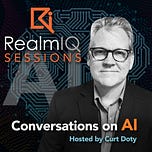This podcast uses synthetic characters, but it is still engaging. The technology is NotebookLM by Google. This is a great overview and discussion. A summary of the event is below:
The El Sailon February Lecture covered a wide range of topics centered around the rapid evolution of AI, its societal impact, and the challenges of regulation, ethics, and adoption. Curt Doty opened the event by reflecting on the origins of El Sailon, emphasizing AI’s pervasive influence across industries and its acceleration into mainstream discourse, as seen in advertising during the Super Bowl. Christopher Alexander from Hutton Broadcasting highlighted AI’s growing role in media, including its use in scriptwriting and proposal development. Discussions then moved into AI’s competitive landscape, particularly the power struggles among tech giants, including Elon Musk’s failed attempt to buy OpenAI and the emergence of DeepSeek, a Chinese AI company raising concerns about data sovereignty.
Curt introduced the Five Stages of AI Adoption—denial, anger, bargaining, depression, and acceptance—suggesting that most people in the room had already reached the acceptance phase, signaling a shift in mindset toward AI integration. Phillip Alcock then explored AI’s potential in education, particularly in project-based learning, where AI helps students develop critical thinking skills by engaging in real-world problem-solving. Andrew Sedillo followed with a discussion on microlearning, emphasizing how AI-driven, bite-sized educational content enhances retention and upskilling, addressing workforce skill gaps efficiently. He noted that New Mexico State University (NMSU) is developing microcredentials tailored to specific industries, ensuring that AI literacy is accessible to a broader audience.
Shifting to AI ethics and governance, Kevin LaGrandeur raised concerns over AI hype, the automation of jobs, and the unchecked expansion of AI-powered weaponry. He pointed out the misleading promises of AI tools, such as Tesla’s Autopilot, which has led to fatal accidents due to consumer over-reliance. The discussion also touched on AI’s use in military applications, including autonomous weapons capable of making kill decisions, highlighting the need for regulatory oversight. While California has enacted state-level AI regulations, the lack of national or international governance remains a critical issue, with Curt Doty stressing that self-regulation by big tech is insufficient.
The event concluded with an engaging Q&A session, where panelists debated AI’s role in shaping future careers, its potential for empowering employees rather than replacing them, and the necessity of AI policies within organizations. The panelists agreed that AI should be seen as a tool for augmentation rather than replacement, and that strategic training, ethical considerations, and proactive governance are essential to navigating AI’s impact. Despite uncertainties, the consensus was clear: AI is here to stay, and the best approach is to embrace it thoughtfully, ensuring it serves as an enabler of innovation, efficiency, and ethical progress rather than a force of unchecked disruption.
Topics Covered
Introduction to El Salon & AI Landscape
Overview of El Salon’s origins and mission.
AI's rapid evolution and its impact across industries.
AI’s presence in major events like the Super Bowl.
AI in Media and Business
The role of AI in media and advertising.
The competitive landscape of AI companies (e.g., DeepSeek vs. OpenAI).
The impact of AI on big tech valuations and governance concerns.
The Five Stages of AI Adoption
Denial: Initial skepticism about AI.
Anger: Resistance and frustration over AI integration.
Bargaining: Gradual acceptance with limitations.
Depression: Fears over job losses.
Acceptance: Embracing AI as a tool for efficiency.
AI in Education and Workforce Training
AI-enhanced project-based learning (Phillip Elcock).
AI-driven microlearning and skill-building programs (Andrew Cedillo).
The role of AI in upskilling professionals.
Ethics and Regulation of AI
The ethical dilemmas of AI in business and warfare (Kevin LaGrandeur).
Risks of AI hype and misrepresentation.
AI's role in military applications and automation of weapons.
AI Policy and Regulation Challenges
California’s AI governance efforts vs. lack of national regulation.
The need for global AI oversight similar to nuclear treaties.
The difficulty of enforcing AI policies at scale.
Future of Work and AI’s Role in Society
AI as a tool for augmenting human abilities rather than replacing jobs.
The evolving nature of education, employment, and technological adaptation.
Predictions about AI’s long-term societal impact.
Significant Quotes
AI's Ubiquity and Acceleration
“We are at this apex, this intersection of the evolution of mankind, the future of work, and the acceleration of technology.” – Curt Doty
AI’s Role in Business and Media
“AI is what everyone’s talking about, and there’s a lot of mystery. But it’s here, it’s happening.” – Christopher Alexander, Hutton Broadcasting
“Elon Musk actually offered to buy OpenAI for $97 billion. Sam Altman’s response? ‘How about I buy Twitter for $9.7 billion?’” – Curt Doty
AI Adoption and Resistance
“At first, people say ‘AI is hype.’ Then they get angry. Then they try to bargain with it. Then they get scared about job losses. But finally, they accept it.” – Curt Doty
“We have to get on the AI train or get run over by it.” – Kevin LaGrandeur
“The real question isn’t how many jobs AI will take away, but how many new opportunities we can create with it.”– Audrey Chia (via Curt Doty)
AI in Education and Learning
“Everything you do with AI is a project.” – Phillip Alcock
“Students using AI need to be critical thinkers, not just consumers.” – Phillip Alcock
“Retention in learning is a huge challenge. Within an hour, people forget 50% of what they just learned. Within a week, they forget 90%.” – Andrew Sedillo
“Microlearning allows students and professionals to focus on a single skill, apply it, and instantly use it in real-world situations.” – Andrew Sedillo
“The best way to learn something is to experience it directly—AI enables that.” – Andrew Sedillo
AI Ethics and Policy
“Google quietly walked back its promise not to use AI for weapons. That’s terrifying.” – Curt Doty
“We regulate nuclear weapons, don’t we? Maybe we should regulate AI too.” – Kevin LaGrandeur
“The military is already developing AI-driven drones that can find, target, and kill without human intervention.” – Kevin LaGrandeur
“Companies need AI policies. Without them, employees don’t understand the ethics of the data they’re inputting, which is a cyber risk.” – Curt Doty
The Future of AI
“Every major technological revolution goes through this—people fear job loss, but within 20 years, we create twice as many new jobs.” – Kevin LaGrandeur
“The AI hype bubble is real. We’ve already seen NVIDIA’s valuation take a hit. But the AI adoption bubble is stabilizing—it’s becoming the new normal.” – Curt Doty
“If AI is used responsibly, it won’t replace humans—it will amplify them.” – Kevin LaGrandeur












